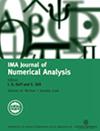Asymptotic consistency of the WSINDy algorithm in the limit of continuum data
IF 2.4
2区 数学
Q1 MATHEMATICS, APPLIED
引用次数: 0
Abstract
In this work we study the asymptotic consistency of the weak-form sparse identification of nonlinear dynamics algorithm (WSINDy) in the identification of differential equations from noisy samples of solutions. We prove that the WSINDy estimator is unconditionally asymptotically consistent for a wide class of models that includes the Navier–Stokes, Kuramoto–Sivashinsky and Sine–Gordon equations. We thus provide a mathematically rigorous explanation for the observed robustness to noise of weak-form equation learning. Conversely, we also show that, in general, the WSINDy estimator is only conditionally asymptotically consistent, yielding discovery of spurious terms with probability one if the noise level exceeds a critical threshold $\sigma _{c}$. We provide explicit bounds on $\sigma _{c}$ in the case of Gaussian white noise and we explicitly characterize the spurious terms that arise in the case of trigonometric and/or polynomial libraries. Furthermore, we show that, if the data is suitably denoised (a simple moving average filter is sufficient), then asymptotic consistency is recovered for models with locally-Lipschitz, polynomial-growth nonlinearities. Our results reveal important aspects of weak-form equation learning, which may be used to improve future algorithms. We demonstrate our findings numerically using the Lorenz system, the cubic oscillator, a viscous Burgers-growth model and a Kuramoto–Sivashinsky-type high-order PDE.连续体数据极限下WSINDy算法的渐近一致性
在这项研究中,我们研究了非线性动力学弱形式稀疏识别算法(WSINDy)在从噪声解样本识别微分方程时的渐进一致性。我们证明了 WSINDy 估计器对于包括纳维-斯托克斯方程、Kuramoto-Sivashinsky 方程和 Sine-Gordon 方程在内的一大类模型是无条件渐进一致的。因此,我们为观察到的弱式方程学习对噪声的稳健性提供了数学上的严格解释。反过来,我们也证明,一般来说,WSINDy 估计器只有条件渐近一致,如果噪声水平超过临界阈值 $\sigma_{c}$,则发现虚假项的概率为 1。我们提供了高斯白噪声情况下 $\sigma _{c}$ 的明确界限,并明确描述了三角和/或多项式库情况下出现的虚假项。此外,我们还证明,如果对数据进行适当的去噪处理(简单的移动平均滤波器就足够了),那么对于具有局部李普希兹、多项式增长非线性的模型,就能恢复渐近一致性。我们的结果揭示了弱式方程学习的重要方面,可用于改进未来的算法。我们使用洛伦兹系统、立方振荡器、粘性伯格斯增长模型和 Kuramoto-Sivashinsky 型高阶 PDE 对我们的发现进行了数值演示。
本文章由计算机程序翻译,如有差异,请以英文原文为准。
求助全文
约1分钟内获得全文
求助全文
来源期刊
CiteScore
5.30
自引率
4.80%
发文量
79
审稿时长
6-12 weeks
期刊介绍:
The IMA Journal of Numerical Analysis (IMAJNA) publishes original contributions to all fields of numerical analysis; articles will be accepted which treat the theory, development or use of practical algorithms and interactions between these aspects. Occasional survey articles are also published.

 求助内容:
求助内容: 应助结果提醒方式:
应助结果提醒方式:


